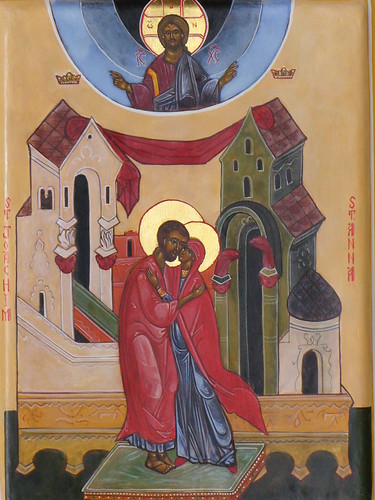Before I get into the egregious planning of resolutions and changes for the New Year (most of which I assume will probably fail), I thought i best to reflect on the year I had. In a few words, it was a good year. Here were the major highlights:
1) I married my lovely wife, Carla on July 23. In the presence of our families and very close friends, I was married according to the practices of the Holy Orthodox Church. I could not have asked for a better manner to enter into this most holy mystery and to do so with the encouragement of my priest, my family and my friends. The service was wonderfully chanted by Rdr. Moses and Holly and I knew that God blessed this union. And I couldn't have asked for a more lovely, charming, beautiful and smart bride!
2) I found out I would be a father. Barely three months into our marriage, my wife tells me I'm going to be a dad. I admit that I'm very nervous and concerned but the only way to look upon this is as a blessing and gift from God. The second I start looking upon this in any manner is to cheapen what He gives.
3) I have a job. Granted, it's not the job I really want. I want to be back in the classroom teaching Latin and Greek. Unfortunately, those jobs are scarce and hard to find and many of them are part time. But this job kept me in Omaha allowing me to develop my relationship with Carla and thus marry her. It allows me to pay my bills and to develop new skills for any future occupation.
4) I love my church. Of course, it's not perfect. The lack of Greek is bad enough, but I'm very grateful to have a priest who helps keep me on track, who is very sincere and prayerful and insists that the church foremost is a place of prayer. My parish family is very kind and I appreciate the opportunities to chant the services of Vespers and Orthros.
5) My family is a very generous group. This includes my biological family and the assumed family of my wife. So many great individuals and all of them have a very strong commitment to what family means and desire to preserve it. I cannot thank them enough for all the great things they have done for me this past year.
6) I have two great cats. I think Araby and Leo were a little unsure of me when I first came here, but they've warmed up to me. They both like attention and love to cuddle early in the morning or when we're just watching TV on the couch.
7) I have a nice home. It's Carla's home technically; I am allowed to "squat" here. Togther we made improvements to the upper level bathroom and are planning some other improvements (mainly for the baby). The house is in unincorporated Sarpy County and so we're not too far from the city proper though we're far away from it that we don't have to worry about the hustle and bustle of traffic. Just a mile to the south of us are cornfields and farms and it is so nice just to take a walk around those areas.
8) Did I mention I have a beautiful wife? Just checking...
9) I'm still in relatively good health. Don't get me wrong; there's much to improve upon, but I hope to keep my body weight at a good level and to get stronger. I want to be fit when my kid arrives so I can play with him/her and not worry about getting tired. I don't have any major conditions, but I need to be vigilant as diabetes and heart disease are in my family history.
10) My brain still works...kind of.
But with all the blessings come also grief. The one negative thing that sticks out in my mind from this past year is the passing of our dog, Jasmine. We had to put her down in early June when she suffered kidney failure. She was a very faithful companion and we miss her terribly. Sunt bona mixta malis.
All in all, it was a good year, a very good year. I don't know if I can top it in 2012, but if I intentionally try to top it, I think I'm only asking for failure. So, I'm going to basque in 2011 for a few more hours and then I'll contemplate about what I will do differently in 2012.
Not for women and children any longer. . .
23 hours ago





